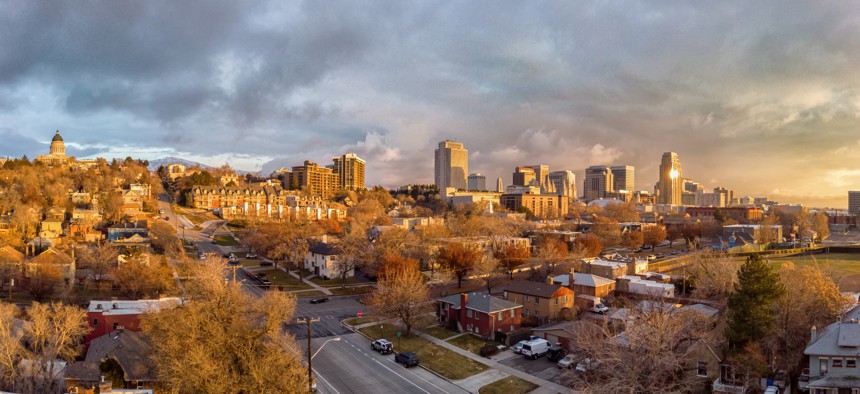For City Leaders, an Upbeat Moment Mixed With Challenges Old and New

A view of Salt Lake City, where the National League of Cities summit is not being held this week. iStock.com/grandriver
Historic amounts of federal funding are flowing to the local level. But cities are also grappling with a host of difficult problems.
Many of the city leaders gathering virtually this week for the National League of Cities annual summit may be disappointed that, due to coronavirus concerns, the event did not take place in Salt Lake City in person, as originally planned.
But at least when looking towards the federal level the group had plenty else to be upbeat about, including President Biden signing a major infrastructure bill this week, and their successful lobbying efforts earlier this year around securing billions in pandemic relief funding for states and localities through the American Rescue Plan Act.
There could still be even more federal dollars on the way for states and localities if Democrats on Capitol Hill are able to successfully steer a roughly $2 trillion domestic spending bill through Congress. And there's bipartisan support for a measure that would provide governments more flexibility in how they can spend ARPA aid.
"The federal government is demonstrating a faith in the leadership of America's mayors and city council members that has not been seen since, perhaps, the Great Depression," Nan Whaley, the mayor of Dayton, Ohio, said during remarks at the NLC event.
NLC's CEO and executive director Clarence Anthony described the present moment as "just the start" of a partnership between local and federal government to ensure that the new funding is used in ways that is beneficial to communities.
"This is the moment for cities to lead," he said.
The boosted federal support is surely welcome in many city halls across the country. But one needs to look no further than the agenda for the NLC summit to get a sense of the tremendous challenges that America's local governments continue to face. There are sessions focused on tackling issues related to inequality, gun violence, homelessness, cyberattacks and water system upgrades.
Meanwhile, cities in many cases are still managing public health and economic fallout from the pandemic.
Even tapping the new federal funding brings complex considerations—in terms of balancing competing priorities, ensuring community input is heard and making sure that spending and reporting on how the money is being used complies with federal rules.
Vince Williams, mayor of Union City, Georgia, during a press conference, explained his city's plans to bring on a contractor to help with the process of spending ARPA funding.
"I didn't want to get my staff bogged down ... with doing something they didn't know," he said. "But also to make sure that we did the right thing," he added, suggesting that the city was trying to avoid compliance pitfalls or other snags with the money.
There's also a darker strain of difficulties afoot for local government leaders that appears to have grown over the course of the pandemic.
NLC recently issued a report based on nine interviews and survey responses from 112 local public officials. Eighty-one percent of those surveyed reported experiencing harassment, threats or violence. And 87% said that during their time office they'd seen this type of behavior towards public officials increase.
"These incidents are rising at an alarming rate," Anthony said, noting that officials have decided to resign or not seek reelection because of the threats and harassment, which in some cases has been directed towards family members and kids. "This has got to stop," he added.
Looking ahead, Los Angeles City Councilmember Joe Buscaino highlighted how the pending domestic spending legislation in Congress includes funding for a number of NLC priorities, such as affordable housing, workforce development and responding to climate change.
"What's before us," Buscaino said, as he reflected on recent developments with federal funding for local governments, "is a life changing investment in cities."
Bill Lucia is a senior editor for Route Fifty and is based in Olympia, Washington.
NEXT STORY: Accessibility: A roadmap for creating an equitable experience






